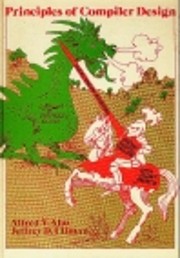

Auf ein Miniaturbild klicken, um zu Google Books zu gelangen.
|
Lädt ... Principles of Compiler Design (1977)von Alfred V. Aho, Jeffrey D. Ullman
 Keine Keine aktuelle Diskussion zu diesem Buch. keine Rezensionen | Rezension hinzufügen
Gehört zu Verlagsreihen
Keine Bibliotheksbeschreibungen gefunden. |
Aktuelle DiskussionenKeineBeliebte Umschlagbilder
 Google Books — Lädt ... Google Books — Lädt ...GenresMelvil Decimal System (DDC)001.6425Information Computer Science; Knowledge and Systems Knowledge [formerly : Data processing] [formerly : Electronic] [formerly : Computer programs and programming] [formerly : Software & its use]Klassifikation der Library of Congress [LCC] (USA)BewertungDurchschnitt: (3.77) (3.77)
Bist das du?Werde ein LibraryThing-Autor. |
|||||||||||||||||||||||||||||||||||||||||||||||||||||||||||||||||||||||||||||||||||||||||||||||||||||||
Standardlærebogen i compilerdesign, dvs hvordan man skriver en oversætter til et højniveausprog.
I 1981 skrev Michael Schwartzbach en oversætter fra Aka til Pascal og jeg skrev runtimebiblioteket. I 1982 skrev Michael en oversætter til mellemkode og jeg skrev fortolkeren af A-kode. Michael var på vej til USA, så han skrev compileren først. Så skrev jeg fortolkeren og en seddel med underligheder i oversætteren, så da han kom tilbage fra USA gik der et par dage med at rette og så virkede systemet ellers fint i flere år. En af superbrugerne var instruktoren Per Frederik Vilhelm Hasle Harlung, som blandt andet fandt en memory leak. Gad vide om ikke vi kiggede lidt i den her bog undervejs? (